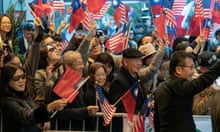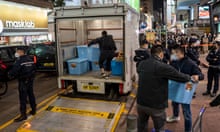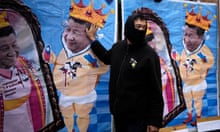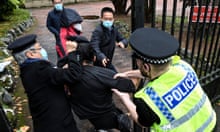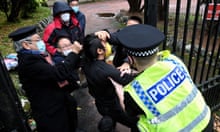One of Hong Kong’s most strident pro-democracy figures has been arrested and the offices of the newspaper he owns searched by police in a stark escalation by authorities enforcing a new national security law brought in by Beijing.
The raid on Apple Daily, Hong Kong’s largest pro-democracy daily paper, and arrest of Jimmy Lai and other senior executives were condemned by activists and journalists, who said they marked “the day press freedom officially died”.
Apple Daily’s publisher, Next Digital Media, said it was “furious” about the raid and arrests. It warned that press freedom was “hanging by a thread” but said its staff remained committed to defending it.
Lai, a 71-year-old media tycoon and outspoken supporter of Hong Kong’s pro-democracy movement, was arrested alongside six others including his son on Monday morning on suspicion of “collusion with foreign forces” and conspiracy to commit fraud.
In a separate incident the pro-democracy activist Agnes Chow was also arrested under the new law, her fellow activist Nathan Law said.
Hong Kong police said nine men and one woman, aged between 23 and 72, had been arrested.

Hundreds of police descended on the Apple Daily building in an unprecedented hours-long raid, which was live-streamed by dozens of the paper’s staff.
“Tell your colleagues to keep their hands off until our lawyers check the warrant,” the editor-in-chief, Ryan Law Wai-kwong, told police. Staff were ordered to produce ID. Midway through the raid a handcuffed Lai was marched through the newsroom.
Thousands watched the streams, which appeared to contradict police claims that “news materials” would not be targeted, as officers casually rifled through papers on journalists’ desks. Boxes of documents were confiscated.
Later, police barred news organisations including Reuters, Agence France-Presse, the Associated Press and the public broadcaster RTHK from attending a press conference about the search.
The Hong Kong journalist association head, Chris Yeung, said the raid was “horrendous”. “I think in some third-world countries there has been this kind of press freedom suppression, I just didn’t expect it to be in Hong Kong,” he told media.
Next Digital accused police of abusing their power and authorities of “breaching press freedom through intimidation and creating an atmosphere of white fear”.
The arrest of Lai, while not unexpected, has alarmed the city, which has been on edge after Beijing imposed a sweeping national security law outlawing sedition and secessionist activities, and foreign collusion.
Lai, who also holds UK citizenship, is the most high-profile figure detained under the law. If charged and convicted, he could face potential sentences of three to 10 years in prison – or up to life for an offence “of a grave nature”.
In 2019 state media labelled him one of a new “Gang of Four” conspiring against Beijing. He is already facing several charges over involvement in last year’s pro-democracy protests, and he was one of 25 people charged on Friday over attending a Tiananmen Square massacre vigil in June.
A report in hawkish Chinese state media mouthpiece the Global Times labelled Lai a “modern-day traitor” and suggested he was unlikely to receive bail and would face “heavy penalties”.
Hong Kong journalists have repeatedly warned that the law would have a chilling affect on local media.
The activist and legislator Eddie Chu Hoi-dick accused the Chinese Communist party of wanting to close Apple Daily, and said Lai’s arrest was “the first step of [a] HK media blackout”.
Claudia Mo, a pro-democracy legislator and a former journalist, said she was more surprised by the raid than the arrest. “This is just so drastic and blatant,” she told the Guardian.
Keith Richburg, a veteran correspondent and now head of Hong Kong University’s media school, said the raid and arrests were outrageous. “I think you can say that is the day press freedom officially died, and it didn’t die a natural death. It was killed by Beijing and it was killed by Carrie Lam and Hong Kong police,” he said.
The police operation marked the first time the law has been used against media in Hong Kong, which has historically had a high level of press freedom. Last month the New York Times announced it was moving part of its Hong Kong bureau to South Korea.
Several outlets have complained of foreign journalist visas not being renewed. On Monday the Standard news website reported that the immigration department had established a national security unit to vet “sensitive” visa applications, including from journalists.
Chinese and Hong Kong officials had promised the security law would not impinge on the city’s civil freedoms, including its independent press. “Today’s police action upends those assurances,” the Foreign Correspondents’ Club of Hong Kong said in a statement.
Benedict Rogers, a co-founder and the chair of Hong Kong Watch, said: “To arrest one of the most moderate, peaceful and internationally respected voices for democracy in Hong Kong … sends the message that no one is safe in Hong Kong unless they stay completely silent and do exactly as Xi Jinping’s brutal regime says.”
There was some speculation that the arrests were retaliation for US sanctions against senior Hong Kong officials, including Lam. The accusations against Lai have been at least partly driven by his meetings with and support from senior US figures including the secretary of state, Mike Pompeo.
In response to the US sanctions, China’s foreign ministry on Monday said that it would be placing sanctions on 11 US officials and lawmakers. A foreign ministry spokesman condemned the US for its “blatant interference” in China’s internal affairs.
On Monday afternoon the stock price of Next Digital, which is owned by Lai, rose more than 300% after some analysts reportedly said they would buy in protest against his arrest.
